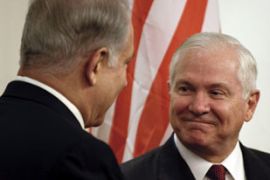US envoy pushes Arab-Israeli peace
Gates urges Arabs to “normalise” ties with Israel as diplomatic efforts continue.

Gates defended attempts by Barack Obama, the US president, to achieve a negotiated settlement to the standoff over demands that Tehran halt uranium enrichment.
“I think … the timetable that the president has laid out still seems to be viable and does not significantly increase the risks to anybody,” he said at a joint news conference with Ehud Barak, his Israeli counterpart.
Military assistance
But he said Washington would continue “to provide a robust annual military assistance package” to Israel.
“We are contributing both financial and technical assistance to strengthen Israel’s defence against the growing threat posed by rockets and missiles, and we will continue to ensure that Israel has the most advanced weapons for its national defence,” he said.
| In depth | |||||
|
Gates also highlighted that achieving long-term security for Israel “depends on a sustainable comprehensive” Middle East peace, a goal he said was important for regional stability.
Barak endorsed the US strategy on Iran, but said any negotiations should be kept to a tight schedule and there should be a readiness to impose tougher UN Security Council sanctions.
“If there is an engagement, we believe it should be short in time, well-defined in objectives, followed by sanctions, preferably [United Nations Charter] Chapter 7-type of sanctions,” he said.
Al Jazeera’s Mike Hanna, reporting from Jerusalem, said that the Obama administration was treating “the question of Iran, the question of Syria, the issue of Israel’s relationships with its neighbours” as linked.
What appears to be happening here is a type of blanket diplomacy,” he said. “It is certainly very different from what has happened in the past and whether it is successful the days ahead will show.
“Clearly the efforts here are to create some kind of period of calm, some breathing space … in which the processes can get under way.”
‘Productive negotiations’
Mitchell, who has already visited Syria and Israel in recent days, stressed the need for all Arab nations, as well as the government in Tel Aviv, to work together to resolve the conflict.
|
“If we are to succeed, we will need Arabs and Israelis alike to work with us to bring about comprehensive peace” George Mitchell, |
“If we are to succeed, we will need Arabs and Israelis alike to work with us to bring about comprehensive peace,” he said.
He also urged the Palestinians to refrain from “words or actions that might make meaningful and productive negotiations impossible”.
Mitchell later repeated his message after meeting Mahmoud Abbas, the Palestinian president in Ramallah in the West Bank.
But after the meeting, Saeb Erekat, the chief Palestinian negotiator, questioned whether Washington’s efforts would be enough to secure an independent Palestinian state in the future.
“If the US cannot have Israel comply with obligations like stopping settlement activities including natural growth, who will believe that the US will be able to have Israel comply to withdraw to the ’67 borders or solve the problems of Jerusalem, refugees, water, security?”
Mustafa Barghouti, the secretary-general of the Palestinian National Initiative, told Al Jazeera that the credibility of the whole US diplomatic effort hinged on whether Israel could be persuaded to stop settlement activity.
“This is going to be the key factor that will decide all the other steps,” he said.
“The Palestinians are demanded to respect all previous agreements and apply certain conditions, while the Israeli government itself is denying and negating in practice all existing agreement and continuing settlement activities.”
Policy disagreements
Gates also held talks with Binyamin Netanyahu, the Israeli prime minister, that largely focused on the Iran nuclear issue.
“Secretary Gates stated that the US and Israel see eye-to-eye regarding the Iranian nuclear threat and explained that the US engagement with Tehran will not be open-ended,” a statement from Netanyahu’s office said.
Netanyahu said on Sunday he hoped key policy disagreements with the US would be worked out during the talks.
“Naturally, in the context of friendly relations between allies, there isn’t agreement on all points,” he said.
Netanyahu is also expected to meet Mitchell in the coming days for talks including possible discussion on calls for a halt to settlement expansion in the occupied West bank.
James Jones, the US national security advisor, will also arrive in the region on Tuesday.
The visits are seen as a strong signal from Obama to keep Israeli-Arab peacemaking high on his agenda.
